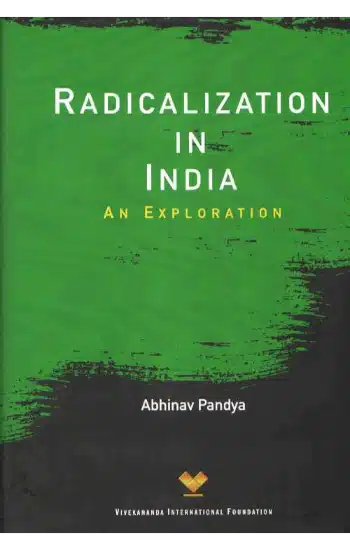
Save: 25%

Save: 25%
Radicalization in India: An Exploration
Publisher:
| Author:
| Language:
| Format:
Publisher:
Author:
Language:
Format:
₹895 ₹671
Save: 25%
In stock
Ships within:
In stock
ISBN:
Page Extent:
Kashmir has been in turmoil since the past three decades or so. The state of dissatisfaction in that part of a free, democratic, secular Indian nation is a rather perplexing development, the question being that how can any well groomed group of citizens, anywhere in the world, want to complain about their political rights in such a free and tolerant environment. The answer is not straightforward.
There are many layers of kaleidoscopic events which have marred the Kashmir scene – Kashmir Valley in fact, a small terrestrial part of Kashmir that hosts the majority population over the past seven decades. It began with Pakistan instigated and aided rapine by coreligionists in the name of consolidation of Pakistan`s religious identity. Kashmir is then sought the safety of the Indian Union. For the next three decades they prospered under more or less selfgovernance with the Union`s full support. The sense of security and freedom, instead of consolidating democratisation of the society, led to the Union`s callous overlook of Pakistan`s overt and covert instigation of the Kashmiri people with a promise of Islamic way of life and great rewards that would supposedly bring them. The Union`s political apathy and endorsement of massive corruption among its local favourites reinforced the people`s distraction from democratic India.
Lastly, over the two decades or so, as the situation slipped from staged protests, sedation, insurgency, terrorism, and now fanatic religious radicalisation of the younger generation, the Union used force to keep Kashmir in control. But it overlooked the more salient followup imperative – offering the people a right nationalist narrative and follow it up with good governance.
It is unfortunate that as the situation went from bad to worse, barring few, there was very little formal effort to delve into the roots of the problem. This book fills that gap.
Kashmir has been in turmoil since the past three decades or so. The state of dissatisfaction in that part of a free, democratic, secular Indian nation is a rather perplexing development, the question being that how can any well groomed group of citizens, anywhere in the world, want to complain about their political rights in such a free and tolerant environment. The answer is not straightforward.
There are many layers of kaleidoscopic events which have marred the Kashmir scene – Kashmir Valley in fact, a small terrestrial part of Kashmir that hosts the majority population over the past seven decades. It began with Pakistan instigated and aided rapine by coreligionists in the name of consolidation of Pakistan`s religious identity. Kashmir is then sought the safety of the Indian Union. For the next three decades they prospered under more or less selfgovernance with the Union`s full support. The sense of security and freedom, instead of consolidating democratisation of the society, led to the Union`s callous overlook of Pakistan`s overt and covert instigation of the Kashmiri people with a promise of Islamic way of life and great rewards that would supposedly bring them. The Union`s political apathy and endorsement of massive corruption among its local favourites reinforced the people`s distraction from democratic India.
Lastly, over the two decades or so, as the situation slipped from staged protests, sedation, insurgency, terrorism, and now fanatic religious radicalisation of the younger generation, the Union used force to keep Kashmir in control. But it overlooked the more salient followup imperative – offering the people a right nationalist narrative and follow it up with good governance.
It is unfortunate that as the situation went from bad to worse, barring few, there was very little formal effort to delve into the roots of the problem. This book fills that gap.
About Author
Reviews
There are no reviews yet.
Related products
Wavell’s Command: The Crucible Of War Book 1 (Paperback ) By Barrie Pit
Save: 0%
Afghan Air Wars : Soviet, US and NATO operations, 1979–2021
Save: 25%
RELATED PRODUCTS
Arjun Subramaniam (Set of 2 War Books)
Save: 25%
90 Years of the Indian Air Force: Present Capabilities and Future Prospects
Save: 30%
Afghan Air Wars : Soviet, US and NATO operations, 1979–2021
Save: 25%
Air Power and the Strategic Balance: The Indian Ocean and Bay of Bengal
Save: 30%
India and The UN Peace Operations: In Service of Humanity and Global Peace
Save: 30%
Pentagon’s South Asia Defence and Strategic Year Book 2010
Save: 25%
Pentagon’s South Asia Defence and Strategic Year Book2012
Save: 25%
Professional Military Education: Making of the 21st Century Warrior
Save: 30%
Study and Practice of MILITARY LAW(9th Revised Edition 2024)
Save: 25%
YOGI ADITYANATH: Blend of Spiritualism and Political Realism
Save: 25%



Reviews
There are no reviews yet.